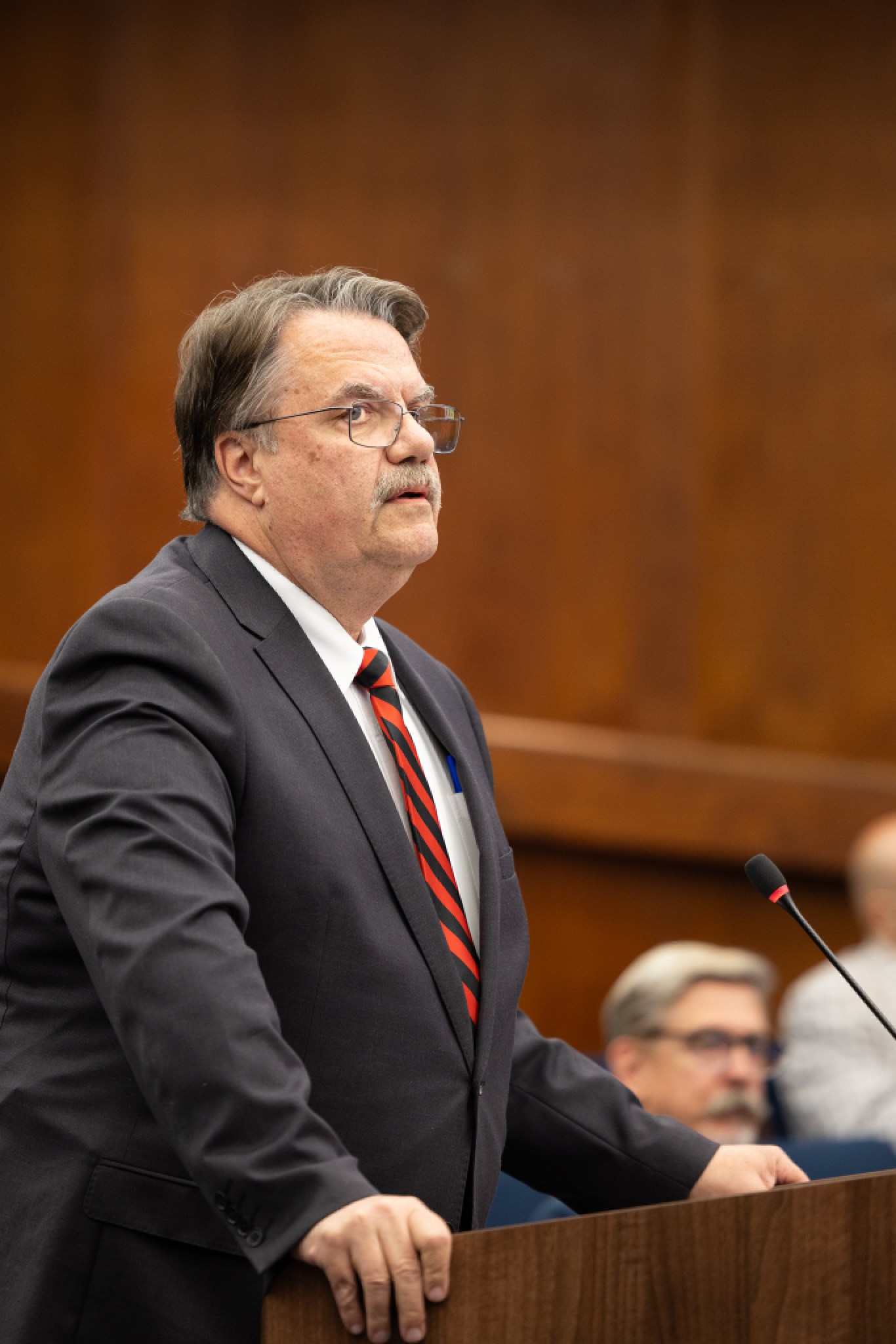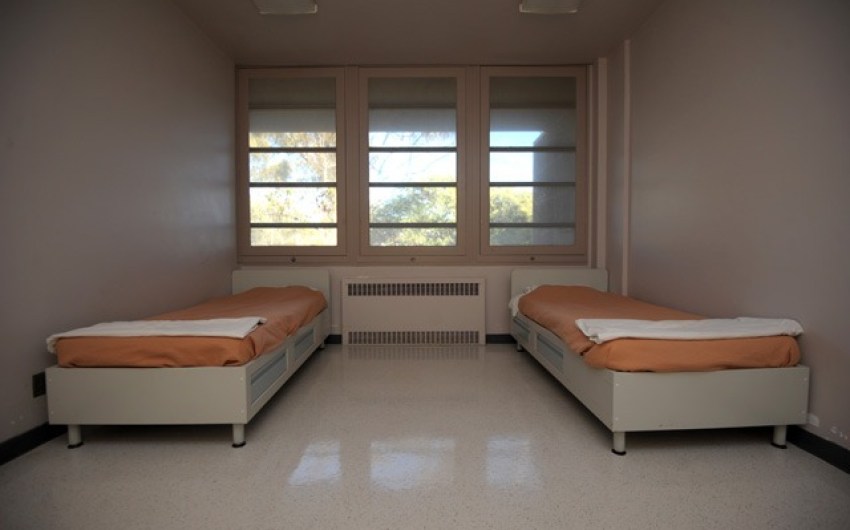Deficits and Benefits of Mental-Health Care in Santa Barbara County Jails
More than 100 People Participated in a Workshop to Improve Services

A workshop on jail reform was packed with more than 100 people wanting to talk about mental-health care on Wednesday morning. Held at Direct Relief’s Santa Barbara headquarters, the gathering came in response to a Grand Jury report last year outlining severe deficiencies in mental-health care in Santa Barbara County’s jails, which had sparked backlash against Sheriff Bill Brown, who runs the jails, and the jails’ private health-care provider, Wellpath.
Sheriff Brown started off the dialogue by highlighting current policies that are meant to expand behavioral health care in county jails. Last summer, the jail implemented five Behavioral Health Units (BHUs) across the North and South County jails that can serve up to 96 incarcerated people in need of mental-health treatment.
He also highlighted the Medication Assisted Treatment (MAT) program, which primarily focuses on supporting individuals with substance-use disorders through medication and behavioral therapy. Currently, 80 patients are enrolled in the program, up from about 40 patients in March of last year, he added.

Brown finished his statements with a strong plea for additional funding to remodel portions of the “antiquated” Main Jail in South County. “It’s a huge challenge to run. It’s a bigger challenge to be an inmate inside,” Brown said, adding that his hope was for the jail to become a place where positive change took place.
The Sheriff’s Office has also implemented mandatory Crisis Intervention Training for all custody deputies, where they learn about de-escalation tactics without the use of force, suicide prevention, and behavioral illnesses. More than 40 deputies have taken part in the 40-hour course since 2021.
However, Lieutenant Joe Schmidt of the Sheriff’s Training Bureau cites high deputy turnover as the main challenge when requiring this “mandatory overtime” training. Without higher salaries, he said, the Sheriff’s Office is trying to put a focus on its staff’s overall well-being and a strong work-life balance to keep deputies for longer.
Advocates from the Clergy and Laity United for Economic Justice (CLUE), identified by the sea of red scarves, were loud in their calls for more mental-health and drug-focused treatment options and overall contract compliance from Wellpath.
Wellpath and the Santa Barbara County Sheriff’s Office have been scrutinized following a 2017 lawsuit against the County of Santa Barbara — the Murray case — in which the jail would found to have failed “to provide minimally adequate medical and mental health care to people in our jails.” As a result, the county and Sheriff’s Office agreed to a Remedial Plan, which the court agreed would address the issues that Murray exposed.
The plan had a full compliance deadline of 2023, but the county got an extension that August from the Murray attorneys after stating they were unable to comply in time. However, the extension came with 14 additional measures that the county jails must adhere to in order to reach full compliance status — the main job of Wellpath.
“Only one of 15 charts recently reviewed shows compliance … for people who suffer from mental illness and are in restrictive housing,” said Maureen Earls, who co-chairs CLUE’s Criminal Justice Workgroup.
CLUE, the League of Women Voters, and the county supervisors present agreed that Wellpath’s work needs more monitoring. The new Wellpath Oversight Plan will give Behavioral Wellness and Public Health officials more jurisdiction over Wellpath’s role in the county jails to ensure timely contract compliance.
Multiple speakers emphasized that 60 percent of prisoners, or more than 400 individuals, in the jails require mental-health treatment, yet there is no 24-hour on-site mental-health professional available.
One community member — who said she’d experienced mental illness and incarceration — spoke out in the middle of a Q&A session, saying she felt “triggered.” She called the current jail climate a “total failure” and that she felt compelled to “fund another Murray case lawsuit” if things didn’t change.
Wellpath staff were there for the discussion, though they couldn’t provide answers on the spot. Supervisor Das Williams asked how many of their medical staff were on-site at the jail at any given time, but no one in the room could give him an answer. He faced the same response when asked what the prisoner-to-medical-staff ratio was in the county jails.
“There is a desire to make the system work better,” Williams said of the workshop participants, “and I think it’s fairly universal.”
Supervisors Joan Hartmann and Laura Capps were key players in bringing the meeting together, and both emphasized the importance of “interagency collaboration” among the county’s health and justice departments in tackling this issue.
The Board of Supervisors are expected to vote on whether to renew Wellpath’s contract later this month.
Premier Events
Thu, May 02
5:00 PM
Santa Barbara
Things with Wings at Art & Soul
Sat, May 04
10:00 AM
Lompoc
RocketTown Comic Con 2024
Wed, May 01
7:30 PM
Santa Barbara
American Theatre Guild Presents “Come From Away”
Thu, May 02
5:00 PM
Santa Barbara
100th Birthday Tribute for James Galanos
Thu, May 02
5:00 PM
Santa Barbara
Meet the Creator of The Caregiver Oracle Deck
Fri, May 03
4:00 PM
Santa Barbara
Santa Barbara Fair+Expo “Double Thrill Double Fun”
Fri, May 03
8:00 PM
Santa barbara
Performance by Marca MP
Sat, May 04
10:00 AM
Solvang
Touch A Truck
Sat, May 04
11:00 AM
Santa Barbara
Mental Wellness Center’s 28th Annual Arts Faire
Sat, May 04
11:00 AM
Santa Barbara
Community History Day
Sat, May 04
3:00 PM
Solvang
The SYV Chorale Presents Disney Magic Concert
Sat, May 04
7:00 PM
Santa Barbara
A Star Wars Cantina Celebration: Renegades, Rebels, and Rogues
Thu, May 02 5:00 PM
Santa Barbara
Things with Wings at Art & Soul
Sat, May 04 10:00 AM
Lompoc
RocketTown Comic Con 2024
Wed, May 01 7:30 PM
Santa Barbara
American Theatre Guild Presents “Come From Away”
Thu, May 02 5:00 PM
Santa Barbara
100th Birthday Tribute for James Galanos
Thu, May 02 5:00 PM
Santa Barbara
Meet the Creator of The Caregiver Oracle Deck
Fri, May 03 4:00 PM
Santa Barbara
Santa Barbara Fair+Expo “Double Thrill Double Fun”
Fri, May 03 8:00 PM
Santa barbara
Performance by Marca MP
Sat, May 04 10:00 AM
Solvang
Touch A Truck
Sat, May 04 11:00 AM
Santa Barbara
Mental Wellness Center’s 28th Annual Arts Faire
Sat, May 04 11:00 AM
Santa Barbara
Community History Day
Sat, May 04 3:00 PM
Solvang
The SYV Chorale Presents Disney Magic Concert
Sat, May 04 7:00 PM
Santa Barbara


























You must be logged in to post a comment.